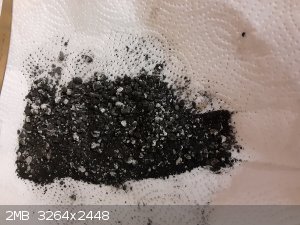
highpower48 - 11-7-2021 at 11:28
I was making some Copper Hydroxide using Nile Reds method. At 1st the wet in beaker participate was light blue/green. For some reason had a problem
vacuum filtering. When i was done filtering and placed the participate on some paper towels to dry it turned a very dark green. It dried in a few days
but developed a white color on some of the chunks. Now it is a very dark green with some white. The reaction was done at room temp. The copper sulfate
pentahydrate was dissolved and then filtered to remove any impurity's. Distilled water was used. Any idea what has happened? Is this even Copper
Hydroxide or something like copper oxide? Thanks

Amos - 11-7-2021 at 17:17
Copper hydroxide prepared from sodium or potassium hydroxide is notorious for quickly decomposing into copper(II) oxide. AND that precipitate is
highly gel-like and always difficult to filter. Using ammonia, like Nile Red did, does not form this same precipitate. Whether or not it is actually
the same chemical compound, Cu(OH)2 or something else such as a basic sulfate, still doesn’t seem to be proven. I think you’d like reading the
sciencemadness wiki to learn about compounds you want to prepare; it would’ve warned you in advance about some of these issues.
ChemTalk - 16-7-2021 at 17:28
Like Amos said, you can get a couple different compounds when adding sodium or potassium hydroxide to copper sulfate, including some basic hydroxides.
And they can turn in copper oxide. One I slowly added copper sulfate to sodium hydroxide and saw 4 distinct colors form.
What are you ultimately trying to form?
